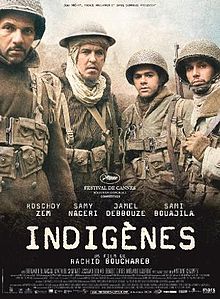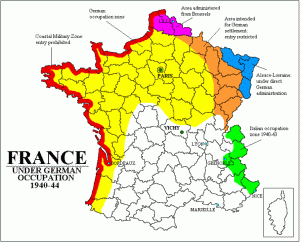 There are a great number of war movies, but this movie offers a unique point of view unlike other movies. On the surface, this movie depicts the resistance and victory against the Nazi occupation in France during World War II, but it is not simply the victory of France–“we went, we killed, we won”; it also indirectly depicts other things sprouting at the time—the independence movement in French colonies and the injustice that followed their independence.
There are a great number of war movies, but this movie offers a unique point of view unlike other movies. On the surface, this movie depicts the resistance and victory against the Nazi occupation in France during World War II, but it is not simply the victory of France–“we went, we killed, we won”; it also indirectly depicts other things sprouting at the time—the independence movement in French colonies and the injustice that followed their independence.
The original title—Indigènes—means “indigenous people.” In general, these are people who lived originally on the land, but become a minority by being pushed down by another race that comes and invades, and are put into the bottom social class. American Indians, Aboriginal Australians, and the Ainu in Japan are a few examples. There are many indigenous groups in the North Saharan Africa—the most well-known of which are the Berber people—and many races ruled over them. The Berbers were pastoral people and they were often put in the bottom social class in African society. However, since they were deeply loyal, brave, and weren’t adverse to traveling, many were used as skilled mercenaries by the ruling class. Most Berbers of Algeria and Morocco who were oppressed by Arabs in North Africa felt that France, the colonist country, treated Arabs and Berbers equally, so they thought of themselves as French, believed France was their homeland, and felt ardent patriotism for France. France organized the Free French Forces based on volunteer soldiers from North Africa to shift the balance against Germany. The Free French Forces consisted of Senegal draftees, the French Foreign Legion, Moroccans, Algerians, Tahitians, etc. This movie is the story of the Berbers who volunteered for the Free French Forces and fought bravely without fearing death.
Abdelkader is an educated man and is appointed as the head of the Berber soldiers due to his top performance on the military service examination. He had an ambition to advance in the French military by studying diligently and earning merits from battle. He mediates between soldiers from an impartial standpoint and advocates for solidarity across cultures among the troops. His efforts are completely ignored, though, and a French Algerian is promoted instead of him. Though feeling humiliated, he doesn’t lose his loyalty to the French military.
Sergeant Martinez, just because he is a French Algerian, is promoted and commands the Algerian Arab troops, but he is not very good at leading the troops rationally and easily becomes violent when he is angry. He even admits to himself that Abdelkader’s leadership was superior to his own. Although he is regarded as French, his mother is in fact Arab—something he doesn’t want others to know.
Saïd is from the poorest area among Berbers. His mother would rather stop her son from volunteering and starve to death than receive the cash bonus and pension from dispatching her son with the troops, but his mother can’t keep him from volunteering and he goes to war to protect France because of his genuine patriotic feelings. Sergeant Martinez notices Saïd’s simple-minded, loyal nature that is without ambition, and so treats Saïd favorably.
Yassir, in order to earn the money to pay for his younger brother’s marriage, enlists with his younger brother. He loves his younger brother and he preaches that a man must always be honest and do the right thing.
Messaoud is a talented marksman and is given the special duty of being a sniper by Sergeant Martinez. He dreams of excelling on the battlefield, becoming a hero for his meritorious service, falling in love with a French woman attracted to his fame, marrying her, and settling down in France when the war is over.
 Their first mission is to capture a fortress from Germany in Provence in southern France. The Berber unit had to walk in front on the mountain trail, completely exposed to the enemy. While the unit is being fired at by the German army, the French soldiers hiding behind the Berbers figure out where the German soldiers are hiding and start to attack the German soldiers. The battle ends with an overwhelming victory for the French forces, but this is the first experience that makes the Berber soldiers realize that they will be given the most dangerous assignments.
Their first mission is to capture a fortress from Germany in Provence in southern France. The Berber unit had to walk in front on the mountain trail, completely exposed to the enemy. While the unit is being fired at by the German army, the French soldiers hiding behind the Berbers figure out where the German soldiers are hiding and start to attack the German soldiers. The battle ends with an overwhelming victory for the French forces, but this is the first experience that makes the Berber soldiers realize that they will be given the most dangerous assignments.
As the war becomes a stalemate and there are orders for the French military to return home, the Berber soldiers are delighted, but the orders to return only apply to French men; soldiers of the Free French Forces are not allowed to return and a pessimistic feeling begins to drift into the unit.
The most difficult order given to the Free French Forces is to do as much damage to the German army as possible until the main French army and American army arrive in order to capture Colmar in Alsace under Nazi occupation. Sergeant Martinez along with another commanding officer of a small unit are assigned to this dangerous mission; the soldiers under his command—Abdelkader, Saïd, Yassir and his younger brother, and Messaoud—also participate in hopes of honor and a reward. However, most of the unit dies from a bomb placed at the entrance to the German-occupied territory and Sergeant Martinez is seriously injured. Yassir, losing his younger brother, grieves that there is no point anymore of him being here; Abdelkader leads the survivors, Saïd, Yassir, and Messaoud, to a village in Alsace and they are welcomed by the villagers. However, in an intense battle with the German army, Saïd tries to protect the seriously injured Sergeant Martinez, but both are killed by the German army; Yassir and Messaoud also die in action.
This is called the Battle at Colmar Pocket. In those days, the Alsace-Lorraine district which contained Colmar was Germany territory and was a key location that guarded the bridge over the Rhine River. After an intense battle, the French and American armies succeeded in forcing the German army to retreat. The Allies had 21,000 casualties while the German army had 38,000. The Allies succeeded in crossing the Rhine River and hereby successfully started a full-scale invasion of German territory.
Abdelkader, the lone survivor, joins the French military in Colmar, but his existence as well as those of his comrades who died are completely ignored. No one thinks about the Berber soldiers that died while the victory of the French unit who only came later is praised.
Soldiers that went to war were guaranteed lifetime pension, and this was one of the motives for volunteering. However, when the struggle for independence in Algeria intensified in 1959, the French government decided to no longer pay the pensions for soldiers from French colonies that participated in the French military. Because Algeria was to eventually become independent from France, the French military did not feel it was necessary to pay money to Algerians of a different country. This movie ends with Abdelkader, 60 years after the battle at Alsace, visiting the gravesite of the soldiers who died in action on this land.
